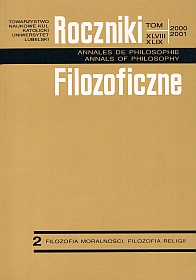Moral Judgements as a Constitutive Element of Scientific Research
Abstract
The paper aims at answering the question of whether scientists qua scientists pass moral judgements. My answer is: “yes”. I claim that moral judgements are necessary for advancing science and that they may even belong to the content of science. This fact threatens neither rationality nor objectivity of science. On the contrary − pretending that science is morally neutral distorts it. I develop two arguments for my theses. First, against the background of the ideal of value-free science I show that value-judgements are constitutive for science. This ideal is not tenable when we consider science as human activity. By analyzing cases of research I then show that in applied sciences both methodological and moral judgements are necessary for any successful inquiry. The structure of scientific research allows me to extend this claim to science in general. Secondly, by considering science as governed by practical − not instrumental − rationality I show that moral judgements, which evaluate actions constitutive of any research as “permissible”, have their source in this rationality. Without them rationality, freedom, and autonomy of science are endangered.
References
Agazzi E.: Das Gute, das Böse und die Wissenschaft. Die ethische Dimension der wissenschaftlich-technologischen Unternehmung, Berlin: Akademie Verlag 1995.
Bergstroem L.: On the Value of Scientific Knowledge, w: K. Lehrer (red.), Science and Ethics, Amsterdam: Rodopi 1987, s.53-63.
Bergstroem L.: Notes on the Value of Science, w: D. Prawitz, B.Skyms, D. Westerståhl (red.), Logic, Methodology and Philosophy of Science. Proceedings of the Ninth International Congress of Logic, Methodology and Philosophy of Science, New York: Elsevier 1994, s. 499-522.
Bunge M.: Basic Science is Innocent: Applied Science and Technology Can Be Guilty, w: Nature and Scientific Method, red. D. O. Dahlstrom, Washington, DC: The Catholic University of America Press 1991, s.95-105.
Kamiński S.: Nauka i metoda. Pojęcie nauki i klasyfikacja nauk, do druku przygotował A. Bronk SVD, Lublin: TN KUL 1992.
Lacey H.: Is Science Value-free?: Values and Scientific Understanding, London: Routledge 1999.
Laudan L.: Science and Values. The Aims of Science and Their Role in Scientific Debate, Berkeley−Los Angeles: University of California Press 1984.
Lekka-Kowalik A.: On the Alleged Moral Neutrality of the Search for Truth in Science, w: P. Kampits, K. Kokai, A. Weinberg (red.), Applied Ethics. Papers of the 21st International Wittgenstein Symposium, Kirchberg a. Wechsel: Austrian Ludwig Wittgenstein Society 1998, s.15-20.
Linneweber-Lamerskitten H.: Is Science a Set of Statements Ethically Independent?, w: J. Cachro, K. Kijania-Placek (red.), 11th International Congress of Logic, Methodology and Philosophy of Science. Volume of Abstracts, Cracow: The Faculty of Philosophy Jagiellonian University 1999, s.404.
Merton R. K.: Teoria socjologiczna i struktura społeczna, Warszawa: PWN 1982.
Scriven M.: The Exact Role of Value Judgements in Science, w: E. Erwin, S. Gendin, L. Kleiman (red.), Ethical Issues in Scientific Research, New York−London: Garland Publishing 1994, s.29-50.
Townsend B.: Rasa a iloraz inteligencji. Kryteria rzetelności badań naukowych, „Ethos”, 1998, nr 4 (44), s.228-252.
Tranøy K. E.: Ethical Problems of Scientific Research: An Action-theoretical Approach, w: A. Lekka-Kowalik, D. Schulthess (red.), Forbidden Knowledge. „The Monist”, 79(1996), nr 2, s.183-196.
Weber M.: Value-judgements in Social Science, w: R. Boyd, Ph. Gasper, J. D. Trout (red.), The Philosophy of Science, Cambridge, MA: MIT Press 1992, s.719-731.
Copyright (c) 2001 Roczniki Filozoficzne

This work is licensed under a Creative Commons Attribution-NonCommercial-NoDerivatives 4.0 International License.





